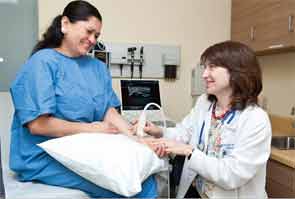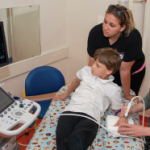
It is here! The ACR launched the long-awaited certification program for musculoskeletal ultrasound (MSUS) in rheumatology at the ACR/ARHP Annual Meeting: Musculoskeletal Ultrasound Certification in Rheumatology, or RhMSUS.
This voluntary certification program helps physicians, physician assistants, and nurse practitioners demonstrate competence in ultrasound to patients, peers, and payers/insurers.
Applicants to the program will need to meet a set of eligibility requirements under one of the six different pathways, pay the fee—$1,500 for ACR members and $1,750 for nonmembers—and pass the examination. There are hundreds of testing sites throughout the U.S. The first testing window will be May 2013, and the second testing window will be November 2013. Those who successfully meet all of the requirements and pass the exam will become RhMSUS certified.
And Now for a Bit of History
The process to determine if the RhMSUS program was necessary has not been a short or easy one, but it has been a labor of extreme care, consideration, and importance to the ACR.
Over the past few years, MSUS has been adopted more widely here in the United States by rheumatologists and other health professionals who treat rheumatology patients. As explored in “American College of Rheumatology Report on Reasonable Use of Musculoskeletal Ultrasonography in Rheumatology Clinical Practice,” studies have shown many potential benefits for adopting MSUS, including faster and more accurate diagnosis, optimized treatment, and improved needle placement accuracy.1 (Turn to page 1 to read more about the MSUS report.) However, the integration of MSUS into rheumatology practice has also raised questions regarding training, education, reimbursement, utilization, competence, certification, and accreditation. As part of the ACR’s commitment to rheumatologists, we gathered experts to examine these questions and provide recommendations regarding the ACR’s role in MSUS. The recommendations have resulted in:
- Training: The ACR has increased support in MSUS education and training. Annually, the ACR now holds several small workshops at the ACR/ARHP Annual Meeting, two two-day fundamentals courses, and one three-day intermediate course with an interventional cadaver workshop. In addition, the ACR’s second eight-month Train-the-Trainer program is currently underway. The goal of this program is to ensure each Accreditation Council for Graduate Medical Education–accredited rheumatology training program has one faculty member who is appropriately trained in MSUS to provide adequate instruction to fellows-in-training. Plans for online activities and mentor programs are currently under evaluation.
- Reimbursement: The ACR’s practice management department actively works on reimbursement issues, including denials for MSUS and overly strict policies. Reimbursement and coding issues through the American Medical Association Current Procedural Terminology and Relative Value Scale Update Committee process are also handled through this department.
- Utilization: The “American College of Rheumatology Report on Reasonable Use of Musculoskeletal Ultrasonography in Rheumatology Clinical Practice” evaluated the reasonable use of MSUS as an additional procedure in the setting of a rheumatologic evaluation and supported use of MSUS in 14 clinical scenarios.
Why Should the ACR Get Involved in Certification?
The ACR’s exploration of certification began in 2010 with the release of the American Institute of Ultrasound in Medicine (AIUM) Training Guidelines for the Performance of Musculoskeletal Ultrasound Examinations. Along with the training guidelines, AIUM developed an accreditation program for MSUS. However, AIUM only accredits the practice or institution and not the individual physician, and the program is intended for MSUS in general, rather than its application in rheumatology. Based on membership surveys, rheumatologists needed a pathway to demonstrate their individual competence in MSUS for rheumatology, and the most verifiable way to do this is through certification because individuals must meet minimum criteria and typically pass an assessment.
